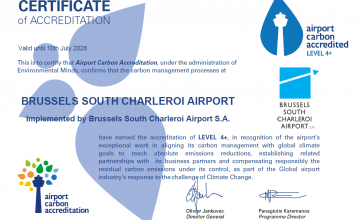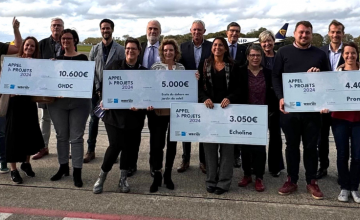Introduction
Brussels South Charleroi Airport strives to be a committed, responsible stakeholder when it comes to tackling environmental challenges. B.S.C.A. is committed to ensuring steady growth over the coming years, while significantly reducing noise and greenhouse gas emissions.
As far as noise is concerned, the revision of approach procedures and the modernisation of aircraft fleets will help to achieve this. Similarly, when it comes to greenhouse gas emissions, the gradual introduction of biofuels and the enhanced performance of next-generation aircraft engines offer invaluable advantages. B.S.C.A. also has a noise exposure plan combined with a soundproofing plan for the most exposed homes, promotes airlines with newer aircraft fleets (less than 6 years old), and is governed by a points quota system to limit later aircraft return times, as well as a penalty scheme when noise levels are exceeded thanks to an extensive network of sound level meters.
B.S.C.A.’s strategy therefore involves ensuring the level of growth that is essential to any economic activity if, and only if, the overall environmental impact of the airport and its activities is significantly reduced.
The Airport’s Environmental Policy
In light of current environmental challenges, Brussels South Charleroi Airport (B.S.C.A.) has fully integrated environmental considerations into its activities. The aim is to minimise our environmental impact while continuing our commitment to sustainable development across the entire airport site. We recognise our role in protecting the environment and the quality of life of future generations.
We are committed to:
- Complying with all applicable environmental regulations and our compliance obligations;
- Integrating environmental criteria into all our processes and strategic decisions;
- Training, raising awareness and informing all our staff, suppliers, passengers and partners;
- Promoting environmental innovation;
- Take into account the environmental impact throughout the life cycle of our infrastructure, services and activities.
Through its environmental policy, B.S.C.A. is committed to the following medium-term goals (by 2030):
- To reduce its direct emissions by at least 90%;
- To neutralise remaining residual emissions through carbon offset projects;
- To reduce its total CO2 emissions (direct and indirect) by at least 25%.
In the longer term (by 2050), we are committed to:
- Reducing our total emissions to 0 grams of net CO2 with carbon offset projects for residual emissions;
- Promoting and supporting the global transition of the aviation sector towards CO2 neutrality.
To achieve this, B.S.C.A. has developed 8 major areas of focus:
Themes
Reducing CO2 emissions, polluting gases and particulate matter
Effectively treating rainwater and wastewater
Limiting noise impact on local residents
Reducing energy consumption and promoting green energy
Decontaminating contaminated soil
Reducing, treating and recycling waste
Encouraging alternatives to fossil fuels
Promoting biodiversity on site and nearby
Sustainable communities
B.S.C.A. aspires to be a catalyst to help make the future more sustainable, not only for its facilities but also for the airport community as a whole.
B.S.C.A. has signed up to the certification programme for the 17 Sustainable Development Goals (SDGs) defined and promoted by the United Nations.
The airport is the first business in Wallonia to get involved in this initiative.
In addition to the “classic” environmental considerations, these 17 goals also include social aspects such as partnerships, justice and growth, grouped into 3 main categories:
- Decent work and economic growth
- Sustainable towns and communities
- Partnerships to achieve the goals: In particular by introducing CEM (Collaborative Environmental Management)
In addition, B.S.C.A. has demonstrated its ongoing commitments by creating the “Well’Air” airport community in partnership with SOWAER and Liège Airport. The aim is to gain a better understanding of the impact of its actions on the health of the community and local residents.
Human and social initiatives
B.S.C.A. supports a number of humanitarian projects, in line with its strategy. To this end, the airport has supported and continues to support organisations such as the Samilia Foundation, committed to combat human trafficking, the Maison Mieux-Être at the Grand Hôpital de Charleroi (GHdC), for people fighting cancer, and the Make-A-Wish association, which grants wishes to seriously ill children.
In 2024, the airport launched its call for projects and donated 50,000 euros to regional organisations working in the fields of sustainable development, young people and health. This call for projects will be repeated every year.
As well as this, collection and donation boxes have been set up in terminal T1 to raise money for a range of organisations.
As part of International Food Waste Day, B.S.C.A. gave out calendars in terminal T1 showing when different fruits and vegetables are in season. The aim was to encourage passengers to eat and store seasonal fruit and vegetables throughout the year. Our partner SSP is also working with Too Go To Go to offer parcels of foods with a short use by date, thus avoiding waste.
Our certifications
Charleroi Airport already stands out thanks to its ISO14001 certification, its participation in the Airport Carbon Accreditation (ACA) programme, recognition for its efforts in support of the 17 Sustainable Development Goals defined by the United Nations (UN), and its active involvement in upcoming regulatory initiatives such as the CSRD (Corporate Sustainability Reporting Directive) and European legislation on greenwashing.



